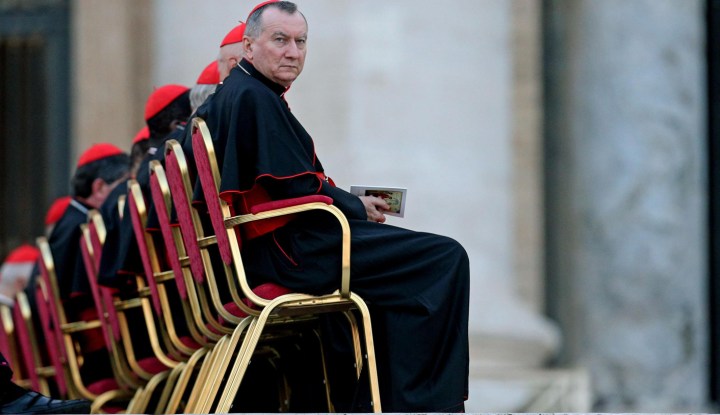Maverick Life
Family Synod, Part III: A mixed bag?

A week of robust debate at the Vatican has come to an end, and the official English translation of the report is anticipated sometime soon. There’s been a mixed response to the discussion, with some applauding the progress made and others voicing disappointment that there has not been enough forward motion. Most importantly, are we even looking at all the most relevant issues? Perhaps not. By RUSSELL POLLITT.
After a week of vigorous public debate at the Vatican that revealed divisions in the hierarchy of the Catholic Church, the first part of the Family Synod, called by Pope Francis, has ended. The ‘relatio’ or report, published on Sunday in Italian (we are still waiting for the official English translation), excited some and disappointed others. The mid-term report, which summarised the discussions that took place in the first week of the Synod, drew much attention because it appeared as if the Church was softening its position on divorce and remarriage, same-sex relationships and cohabitation. The more conservative side of the Church reacted and it seems – in the final report – may have pulled back on some of the open language that was used in the mid-term report.
Has part of the Church managed to put the breaks on Pope Francis and frustrate his reform?
First, it’s important to note that this document does not have the final word. This document is meant to serve as a starting point for further discussions that should take place in the Church all over the world in the next year. Pope Francis asked that all the paragraphs be presented in the final report – even those that did not meet the two-thirds majority vote for passage into the final document. Two of those paragraphs dealt with same-sex relationships and one with divorce and remarriage. The Pope also asked that the voting results be indicated next to each one of the paragraphs – all of them are voted on separately. If the final document were published with only the approved texts, these three paragraphs would not have appeared.
The Pope could have done this for a number of reasons – we can only speculate. He has insisted on transparency, so this may be his way of making sure things are communicated to the outside world and transparency is preserved. He may want people to see that the vote was closer than what has actually been communicated by some people at the Synod. Another reason could be that by including these paragraphs it means that the issues cannot be left out of the universal dialogue in the Church over the next year and will, therefore, have to be discussed again next year when the bishops go to Rome for the second part of the Synod.
Fr. James Martin SJ, editor-at-large of America, suggests that some bishops may have voted against some of the paragraphs as they thought they did not go far enough in addressing the issues in them. Canadian Archbishop, Paul-André Durocher, says on his blog: “Why did some Bishops choose not to approve a text which only repeated the Church’s received teaching? I have the impression many would have preferred a more open, positive language. Not finding it in this paragraph, they might have chosen to indicate their disapproval of it. However, it has also been published, and the reflection will have to continue.” Hence the votes may not necessarily mean disagreement and ‘push-back’ but disagreement because it does not ‘push-forward’ enough!
Fr Thomas Reese SJ, a senior analyst for American-based National Catholic Reporter, says that the Synod was a win for Pope Francis and openness: “The synod was a victory for openness and discussion in the church and the final document is an invitation for everyone in the church to join that discussion. This is exactly what Pope Francis wanted.” Reese makes another interesting comment: “Unlike we journalists, he has not obsessed over the language of the report but has been much more focused on the process. He set the tone at the beginning by encouraging the bishops to speak freely.” It wasn’t just journalists that obsessed over language – some bishops did too.
Veteran Vatican journalist, John Thavis, says that the Synod’s long-term results are going to be most significant. He writes, “Chief among them is that Pope Francis clearly placed the church on a new path, toward an evangelising style that is less focused on doctrine and more willing to invite people in, no matter what their ‘status’.” Thavis also says “Reading the final document, I have the impression that the editing and the doctrinal buttressing in this text represents an attempt to salvage a vision of the church that, under this pope, is moving in a different direction. It may be, as German Cardinal Reinhard Marx said, ‘three steps forward and two steps back,’ but that’s not standing in place.”
A number of things emerge from this Synod:
There is a new, open dialogue that is taking place in the Catholic Church. In the past some topics were simply taboo but, under Francis, this has changed. Pope Francis really desires a church that is transparent. This has been clear right from the beginning of this Synod: In the opening session he said “speak boldly and listen with humility” and at the end he asked that paragraphs, which would have been excluded by the two-thirds majority vote, were incorporated into the final text. This Synod has not simply been one in which doctrine was reaffirmed but, rather, one in which the pastoral care of people in various circumstances has been taken into account – and discussed.
Another strong thing emerged from the Synod: there are deep divisions in the hierarchy of the Church when it comes to family and sexuality. I was quite surprised, at times, to see just how public these divisions seemed to be (this is also something new – perhaps made more acute by social media? – as in the past bishops may have disagreed internally but presented a united position publicly). It is clear that the divide is between bishops who want to focus on law and doctrine versus those who want to emphasise mercy and inclusivity. In an interview on BBC’s Radio 4, Cardinal Vincent Nichols of Westminster expressed his view that things didn’t go “far enough”. Speaking about the paragraphs on same-sex issues in the final document he said: “I didn’t think it went far enough; there were three key words as far as I was concerned … ‘respect’, ‘welcome’ and ‘value’. I was looking for those words and they weren’t there, and so I didn’t think that was a good paragraph.” These words were used in the interim report last week but omitted from the final report.
It’s also clear that Pope Francis is not scared of rigorous debate. He changed the methodology of this Synod and, it seems, this was to do simply that: encourage discussion on contentious issues. This is new for the Church – a Pope that encourages rigorous debate and does not suggest some things cannot be discussed. He did not say much himself but spent most of the time present, listening.
A number of theologians will feel a ‘new freedom.’ Many theologians have not felt free to thoroughly debate issues in the Church in the last few decades for fear of being silenced. This Synod will instill confidence in theologians who are working in various theological disciplines and will, hopefully, encourage new, open theological debate. This is significant for development in the understanding of Church teaching and, in the end, the development of doctrine itself. Theology and doctrine are not static; they evolve.
Although there were significant shifts in tone and direction, I think the Synod was a mixed bag. Unfortunately, it seems that the focus of the Synod was primarily on three issues: divorce and remarriage, cohabitation and same-sex relationships. While these are important issues that certainly need to be addressed, I wonder if they did not narrow the focus of conversation. Frankly, was too much of a big deal made of these issues at the expense of other burning issues like the impact of HIV on family life, child-headed households, single parents, geo-political, social and economic issues that have forced changes in understanding family life?
There are significant shifts in worldview as society evolves and understanding develops and shifts – the very understanding of ‘family’ has changed and is significantly different in a more communal society like Africa compared to that, for example, of contemporary Europe. One size certainly does not fit all.
Little was said about the changing consciousness of the role of women in contemporary societies. Even traditional societies in Africa are seeing change as consciousness is raised. We cannot deny the fact that women are taking on ever-increasing important roles in society; these too have consequences on family life.
I would have liked to see some discussion on ecological factors and how these could impact on (or are being impacted on) by our notions of family. I wonder too if enough time was spent listening to experts in the fields of psychology, sociology and anthropology – theology must be in dialogue with the sciences, it does not operate in a vacuum and science too is a source of revelation. The voices of other mainline Churches were missing – might it have been good to invite people from other Christian traditions to address the Synod and offer other theological perspectives?
While following the discussion and debate at the Synod I also wondered just how in-touch with their constituencies some of the bishops actually are. Some seemed rather more ‘street-wise’ than others. I hope, in the next year before the bishops meet again, they will take time to listen to their constituencies with the openness that has be born in the last two weeks – a willingness to listen could really enrich the dialogue in the Church over the next year.
The first phase of the Synod has ended and bishops will make their way home to dioceses all over the world. The next phase – dialogue in the worldwide Church – might be more important than that of the last two weeks. Pope Francis has certainly indicated what the parameters of the dialogue should be: bold and open, listening with humility. Nothing has been excluded from the discussion. The bishops who were at the Synod now have the responsibility of facilitating this and must ensure it happens – that there is a ‘global conversation’. Catholics, who want their voices heard, now have a year to express their thoughts and reflections.
The last word of this process is still a long way off. After the gathering of bishops in October 2015, Pope Francis will write an apostolic exhortation that will mark the end of the process and reflect the conclusions of the Synod. It will ultimately give the Church direction and focus the Church’s pastoral ministry to families in the future. It will be the most important document of all: Pope Francis will have the final word. DM
Photo: Secretary of Vatican State, Pietro Parolin, during a vigil prayer with Pope Francis in preparation for the Third Extraordinary General Assembly of the Synod of Bishops at Saint Peter’s square in the Vatican City, 04 October 2014. EPA/ALESSANDRO DI MEO















 Become an Insider
Become an Insider